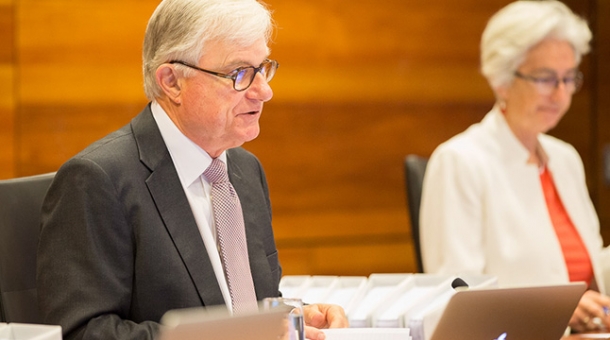Image

Case Study 35: Catholic Archdiocese of Melbourne
Case Study 35: Catholic Archdiocese of Melbourne
The public hearing inquired into the response of the Catholic Archdiocese of Melbourne to allegations of child sexual abuse.
- Stage 1: Public hearing in Melbourne from Tuesday 24 November 2015.
- Directions hearing to consider Cardinal George Pell’s and Bishop Ronald Mulkearns’ capacity to attend the third part of the public hearing in Ballarat, in Sydney on Friday 5 and Monday 8 February 2016.
- Stage 2: Cardinal George Pell gave evidence from 29 February 2016 by video link from Rome. The Royal Commission sat in Sydney and, in accordance with a request from Cardinal Pell, the hearing commenced at 08:00am AEDT. The Trench Room at Ballarat Town Hall was made available for members of the community during the public hearing, including Cardinal Pell’s evidence.
- Directions hearing to set a further hearing date to receive the evidence of four former officers of the Catholic Education Office, in Sydney on Wednesday 13 April 2016.
- Stage 3: Public hearing in Sydney on Wednesday 27 April 2016. The purpose of the hearing was to receive the evidence of four former officers of the Catholic Education Office.
The scope and purpose of the public hearing is to inquire into:
- The response of relevant authorities within or associated with the Archdiocese of Melbourne to allegations of child sexual abuse against Catholic clergy associated with the Holy Family Parish, Doveton, and the Holy Family Primary School, Doveton.
- The response of the Archdiocese of Melbourne to allegations of child sexual abuse against other Catholic clergy, including Fr Wilfred Baker; Fr David Daniel; Fr Nazareno Fasciale; Fr Desmond Gannon; Fr Paul Pavlou; and Fr Ronald Pickering.
- Any related matters.
For more information on each stage, please see documents and transcripts below.
Exhibits
See all exhibits for this case study
The Royal Commission’s Terms of Reference required that its work did not prejudice current or future criminal or civil proceedings. For this reason, the Commissioners delivered an un-redacted and a redacted version of this report and recommended that the un-redacted report should be tabled and published at the conclusion of the relevant criminal proceedings. Both versions of the report can now be found below:
Opening address
Document
Submission
Document
Document
Transcript
Witness list
Image
Image

